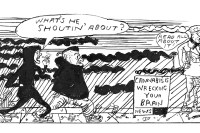Elections in Wales are supposed to be boringly predictable. Until the 2019 European election, Labour had come first in 38 of the last 39 Wales-wide election contests, including all 26 of the last general elections, in a run that began in 1922. But all good – or bad – things tend to come to an end eventually.
To describe what happened in the European election as an electoral earthquake in Wales seems almost to understate the magnitude of what happened. The Brexit Party, who did not even exist until six weeks ago, got more than double the Labour vote share, and came first in 19 of the 22 local authority areas in Wales. Nigel Farage’s new outfit won half of Wales’s four seats in the European Parliament – to add to the presence that Ukip defectors had already allowed them to establish in the Welsh Assembly.
But the Brexit Party were not the only people celebrating in Wales after the results were declared. Plaid Cymru were delighted with a strong second place – a result that meant that they had beaten Labour for the first time ever in a Wales-wide election. Their leader Adam Price has thus achieved something that proved beyond all his predecessors. This may be important for the Welsh nationalists, as they look forward to the devolved Welsh election less than two years from now: the psychological barrier, among their own members and some voters, that they could never defeat Labour, has now been decisively overcome.
It is difficult to overstate just how horrendous this election was for Labour in Wales. This was only the second time they have failed to win in Wales in 100 years. The previous occasion was the 2009 European election – which they could safely blame on prime minister Gordon Brown, by then about as popular with much of the public as a cholera epidemic. In 2009, Welsh Labour very narrowly lost to the Conservatives. In 2019, they were slaughtered – coming a very distant third, and only just holding onto their European Parliament seat. In Wales’ largest local authority, Cardiff – where Labour have a huge majority on the city council, and hold all four constituency seats for both Westminster and the Welsh Assembly – the party finished fourth.
The result is particularly bad news for the Labour First Minister, Mark Drakeford. In office for six months, his first electoral test has been a dreadful defeat. Drakeford’s approach of avoiding public differences with Jeremy Corbyn has been, in these elections at least, a catastrophic failure. That approach had meant the party turning its back on the strategy that had proven highly successful during the devolved era: of asserting a strong Welsh Labour identity and ‘clear red water’ between the party in Wales and the UK leadership in London.
Drakeford’s leadership is not yet being openly challenged, but there is already strong public pressure from party members and even fellow ministers in the Welsh Government for a much clearer pro-Remain line to be asserted.
The only positive thing one can say about the Labour result in Wales is that it wasn’t as bad as that of the Conservatives. A swing of one thousand votes and they would have come sixth in Wales, behind the Greens (who, unlike in England, suffered from the pro-Remain vote being further fragmented by the competition from Plaid Cymru).
The Tories lost almost two-thirds of their vote share in Wales from the 2014 European election; in places of traditional strength like the Vale of Glamorgan (where the Conservatives hold the parliamentary seat that makes up much of the local authority area) they finished fifth; in one valleys local authority they actually came eighth. On this sort of performance the party would struggle to retain a foothold in the Welsh Assembly in 2021, never mind challenge Labour’s stranglehold over the devolved institution.
Voting is habit-forming. Unless they are given strong reasons to do otherwise, people tend to repeat their behaviour from one election to the next. So non-voters carry on not voting, Conservative supporters gradually become lifelong Tories, and so on.
But once people have been jolted out of their electoral habits, they are more likely to diverge from their long-term patterns again in the future. Such may be one of the most important longer-term impacts of these elections. Less than two years ago, some 82.5 per cent of those voting in Wales supported one or other of the two traditional main parties.
In these European elections, that share was down to 21.8 per cent – it hardly needs saying that this is an all-time low. No-one thinks that, if we do get a general election this year, the two traditional big parties will do that badly. But nor would those parties be wise to assume that all of the voters who abandoned them last week will necessarily hurry back into the fold.






Comments